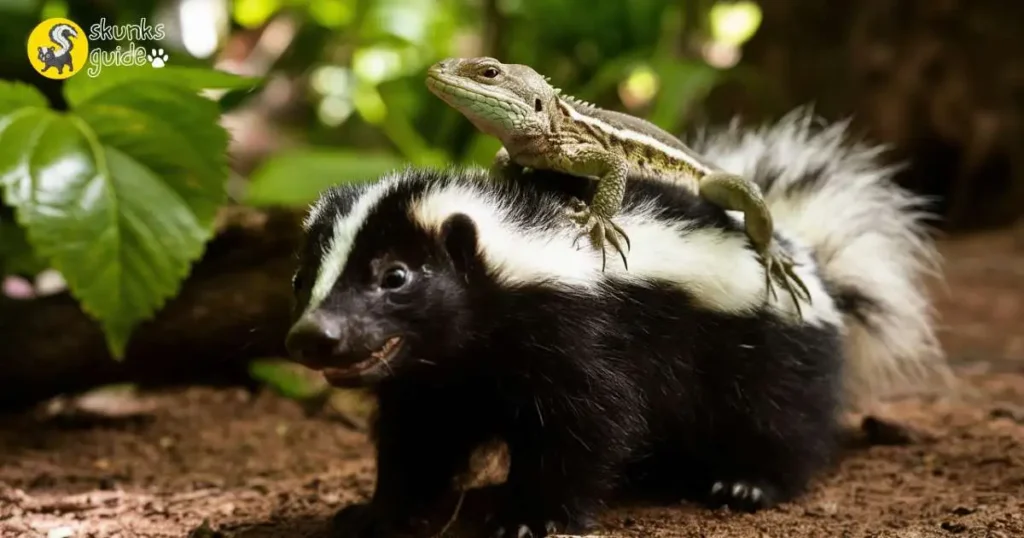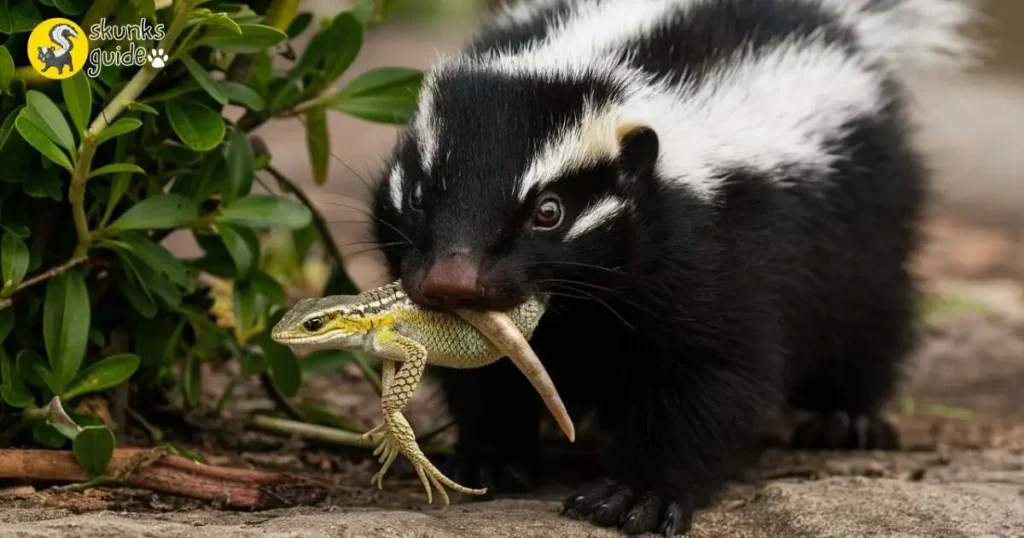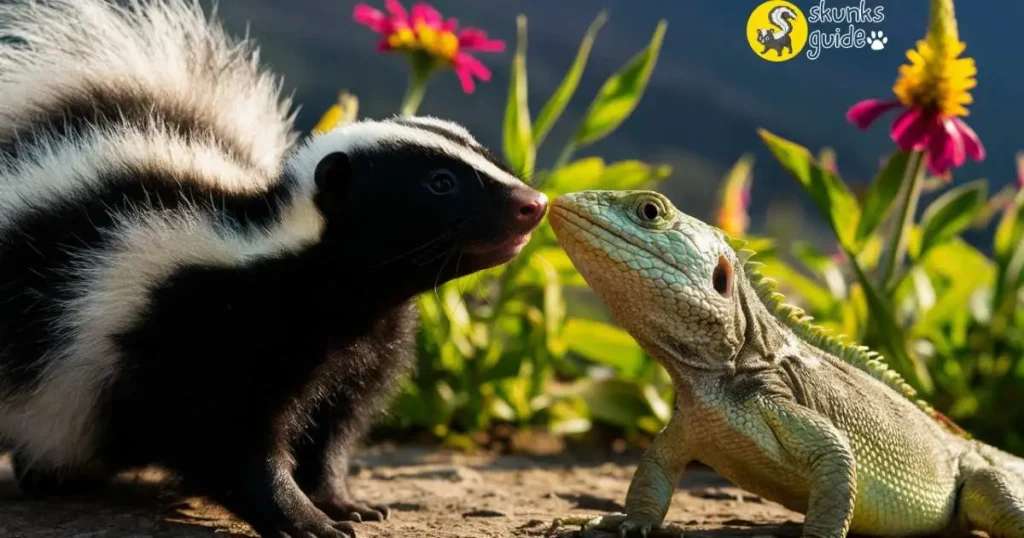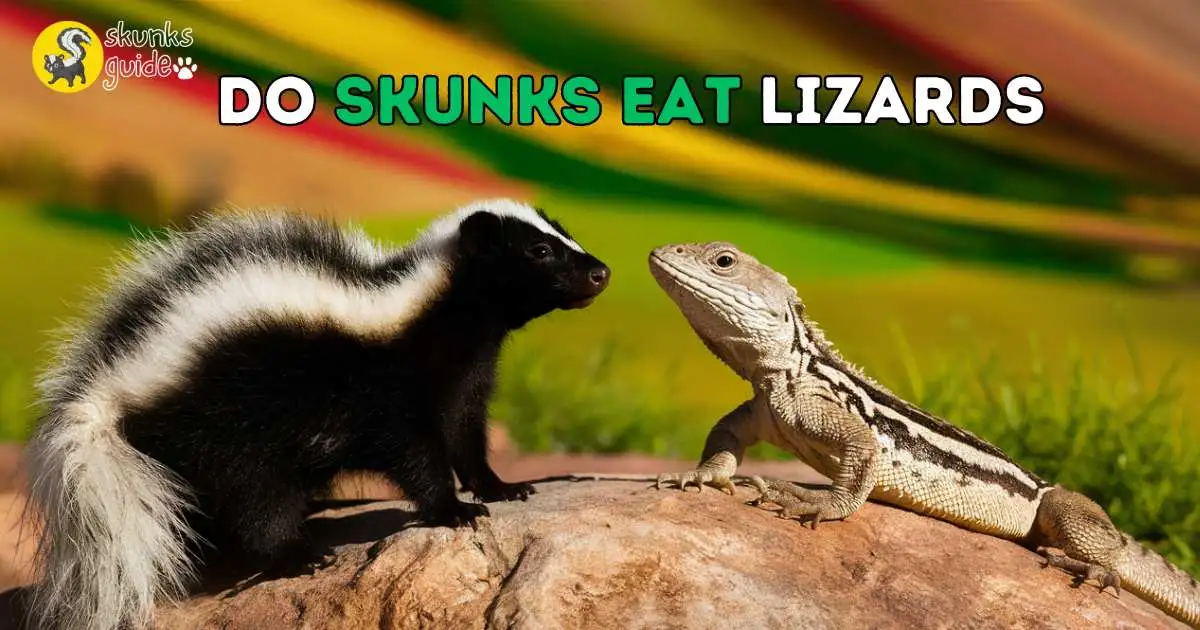Do Skunks Eat Lizards?
Yes, skunks eat lizards! As someone who owns a skunk and has studied their behavior, I’ve learned that these creatures aren’t just about their famous spray—they also have a wide-ranging diet that includes insects, fruits, and small animals like lizards. Understanding what skunks eat can help you manage their presence around your home and garden. If you’re curious about how skunks hunt and what they contribute to the ecosystem, this is the content for you!
Predatory Instincts Of Skunks

Skunks are often misunderstood creatures. They are not just famous for their strong smell. Skunks have sharp instincts for hunting. They can be quite effective predators. Understanding their predatory nature reveals much about their diet. One question arises: do skunks eat lizards?
Hunting Techniques
Skunks use various techniques to catch their prey. They are known for their stealth and agility. Here are some key methods they employ:
- Stalking: Skunks quietly approach their targets.
- Burrowing: They dig through the ground to find hidden lizards.
- Sniffing: Their keen sense of smell helps locate food.
Skunks often hunt at night. This nocturnal behavior gives them an advantage. They can ambush unsuspecting lizards and other small animals. Their sharp claws and teeth make them formidable hunters.
Omnivorous Nature
Skunks are not picky eaters. They eat both plants and animals. This makes them omnivorous. Their diet includes:
| Type of Food | Examples |
|---|---|
| Insects | Beetles, grasshoppers, and crickets |
| Small Animals | Lizards, mice, and eggs |
| Fruits and Vegetables | Berries, nuts, and roots |
Skunks will eat lizards if they find them. Their diverse diet helps them survive in different environments. This adaptability plays a crucial role in their hunting success.
Lizards As A Food Source
Skunks are opportunistic eaters. They consume various foods, including lizards. Understanding their diet helps us know their role in the ecosystem.

Nutritional Value
Lizards provide essential nutrients for skunks. They are a good source of protein and fat. Here are some key nutritional benefits:
- High Protein: Supports muscle growth and repair.
- Healthy Fats: Provides energy for daily activities.
- Vitamins: Essential for overall health.
- Minerals: Important for bone strength.
These nutrients help skunks thrive in their habitats.
Availability In Skunk Habitats
Lizards are commonly found in skunk habitats. They inhabit areas like:
- Woodlands
- Grasslands
- Deserts
- Urban gardens
Skunks often hunt lizards during:
- Dusk and dawn
- Warm weather
These times increase the chances of finding lizards. Skunks adapt their diet based on available food sources.
Skunk-lizard Interactions
Skunks and lizards share habitats in many regions. Understanding their interactions is important. Skunks may eat lizards, but this is not common. Various factors influence these encounters.

Encounters In The Wild
Skunks often roam during the night. They search for food, including insects and small animals. Lizards, like the Western Fence Lizard, also hunt insects.
Some common lizard species include:
- Green Anole
- Blue-tailed Skink
- Gopher Tortoise
Skunks may catch lizards occasionally. This happens mainly in areas with overlapping habitats. Most lizards can escape easily due to their speed.
When lizards and skunks meet, lizards often rely on their agility. They quickly dart away to avoid becoming prey.
Territorial Overlaps
Skunks and lizards often inhabit similar regions. They both enjoy warm, sunny environments. This overlap creates competition for resources.
Key factors influencing territorial overlaps include:
| Factor | Impact |
|---|---|
| Habitat Type | Both prefer areas with ample cover. |
| Food Sources | Skunks eat insects while lizards hunt them. |
| Predator-Prey Dynamics | Skunks can be a threat to smaller lizards. |
In shared habitats, both species adapt. Skunks may adjust their hunting times to reduce encounters. Lizards may become more alert to threats.
Understanding these interactions helps in wildlife conservation efforts. It highlights the importance of maintaining balanced ecosystems.
Factors Influencing the Skunk Diet
Skunks have diverse diets. Their eating habits change based on various factors. Understanding these factors helps explain why skunks eat certain foods.
Seasonal Variations
Skunk diets change with the seasons. Different foods are available at different times. Here’s how seasons influence what skunks eat:
- Spring: Skunks eat insects and plants.
- Summer: Fruits and vegetables are abundant.
- Fall: Skunks gather food for winter. They eat nuts and seeds.
- Winter: Skunks rely on stored food. They may also eat small animals.
These seasonal changes affect skunk behavior and hunting. Skunks adapt well to find food.
Regional Diet Differences
Skunk diets vary by location. Different regions provide unique food sources. Here’s a comparison of skunk diets in different areas:
| Region | Main Food Sources |
|---|---|
| Urban Areas | Food scraps and small mammals |
| Rural Areas | Fruits, insects, and plants |
| Forested Areas | Nuts, seeds, and small reptiles |
Skunks adapt their diets based on what is available. This flexibility helps them survive in different environments.
Conservation And Ecosystem Impact
Skunks play a vital role in their ecosystems. Their diet includes various creatures, like lizards. Understanding skunk predation helps us appreciate their impact on nature.
Skunk Predation Effects
Skunks mainly eat insects, small mammals, and reptiles. Their predation affects lizard populations significantly. Here are some effects:
- Population Control: Skunks help keep lizard numbers in check.
- Diversity Maintenance: Predation encourages a variety of species.
- Food Web Balance: Skunks are a part of the food chain.
Without skunks, lizard populations could grow too large. This may lead to overgrazing of vegetation. Healthy ecosystems need balance to thrive.
Balance In Ecosystems
Every species contributes to ecosystem health. Skunks help maintain this balance. Here’s how:
- Regulating Prey Species: Skunks eat lizards, preventing overpopulation.
- Promoting Biodiversity: They encourage different species to coexist.
- Soil Health: Skunks aerate the soil while foraging for food.
Conservation efforts must consider the role of skunks. Protecting them helps sustain balanced ecosystems. Healthy habitats ensure all species thrive.
Frequently Asked Questions
Do Skunks Eat Reptiles?
Yes, skunks do eat reptiles. Their diet includes various small animals, such as lizards and snakes. Skunks are opportunistic feeders, so they will consume reptiles when available. They primarily hunt at night, making them effective predators of these creatures.
What Attracts Skunks To A Yard?
Skunks are attracted to yards for food sources like insects, grubs, and fruit. They also seek shelter in debris, tall grass, or burrows. Pet food left outside can draw them in. Maintaining a clean yard and securing trash can help deter these critters.
What Is A Skunk Main Predator?
Skunks mainly face threats from predators like coyotes, foxes, and birds of prey. Domestic dogs can also pose a risk. Their strong odor serves as a defense mechanism, deterring many potential attackers. Despite this, young skunks remain vulnerable to various predators in their environment.
Conclusion
Skunks are opportunistic feeders and may eat lizards if they come across them. Their diet mainly consists of insects, fruits, and small mammals. Understanding skunk behavior helps in managing their presence around homes. Keeping your yard clean can reduce wildlife encounters, ensuring both skunks and lizards thrive in their habitats.

